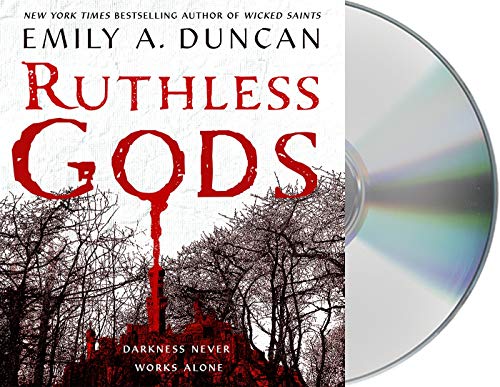
The stunning sequel to instant New York Times bestseller, Wicked Saints
"Ruthless Gods opens the door to a world of fallen gods and eldritch horrors... Gruesome, grotesque, and so, so glorious." - Erin A. Craig, New York Times bestselling author of House of Salt and Sorrows
Nadya doesn’t trust her magic anymore. Serefin is fighting off a voice in his head that doesn’t belong to him. Malachiasz is at war with who--and what--he’s become.
As their group is continually torn apart, the girl, the prince, and the monster find their fates irrevocably intertwined. Their paths are being orchestrated by someone…or something. The voices that Serefin hears in the darkness, the ones that Nadya believes are her gods, the ones that Malachiasz is desperate to meet―those voices want a stake in the world, and they refuse to stay quiet any longer.
In her dramatic follow-up to Wicked Saints, the first book in her Something Dark and Holy trilogy, Emily A. Duncan paints a Gothic, icy world where shadows whisper, and no one is who they seem, with a shocking ending that will leave you breathless.
"Ruthless Gods will leave fans demanding the final installment in the trilogy." - Christine Lynn Herman, author of The Devouring Gray
- ISBN10 1250262666
- ISBN13 9781250262660
- Publish Date 7 April 2020
- Publish Status Out of Print
- Out of Print 22 June 2024
- Publish Country US
- Imprint St Martin's Press
- Format Audiobook (CD)
- Duration 16 hours and 13 minutes
- Language English
Reviews


annieb123
Ruthless Gods is the second book in the Something Dark and Holy trilogy by Emily A. Duncan. Released 7th April 2020 by Macmillan on their Wednesday Books imprint, it's 544 pages and available in hardcover, paperback, audio, and ebook formats. It's worth noting that the ebook format has a handy interactive table of contents as well as interactive links. I've really become enamored of ebooks with interactive formats lately. It's especially convenient with huge doorstop fantasy tomes like this one.
This is a very dark, graphic, atmospheric, and creepily compelling YA/NA fantasy. It starts, chillingly enough, with a young girl chained to a rock who is to be sacrificed to an eldritch horror/god. There is an overarching war, invasions, lots of skullduggery, frenemies, and machiavellian machination behind the scenes. The alternating point of view narrative is easy to distinguish by the chapter headings as well as the author's alternating stylistic voice.
As the second book in the series, I found myself struggling a fair bit to keep the dramatis personae straight in my head and make sense of what had gone on in the first book. I don't recommend it as a standalone unless the reader is willing to put in the effort - there's definitely no spoon feeding on the part of the author. (The first book in the series is 385 pages, it's worth reading them in order).
On a very positive note, the writing is exceptionally good. The descriptions are crystal clear and evocative, the dialogue "fantasy-standard" but never clunky or awkwardly written. It's a very good, very creepy book written by a gifted storyteller. My middle aged self is trying not to say that it's too creepy for teens/YA, but it was quite creepy for *me*. (Then again, I'm not really the target audience).
Four stars for me, four and a half for fans of creepy epic campaign fantasy.
Disclosure: I received an ARC at no cost from the author/publisher for review purposes.

Witty and Sarcastic Bookclub
Gothically gorgeous, this follow-up to Wicked Saints (review here) was everything I wanted it to be. I loved the darker vibe, and the progression of characters. It took a little bit longer to really “get going” than the first book did, but the character-building made it worth it. All of the main players have had their world shaken in some form or another, and seeing how they handled it (or didn’t) was fascinating.
I enjoyed reading about Nadya’s crisis of faith (for lack of a better term); it was heartbreaking and interesting, all at once. As in Wicked Saints, Malachiasz was my favorite (I’ve nicknamed him “Mal” because there is zero chance I’ll ever read that name correctly). He’s such a complicated character; I love it!
Emily A. Duncan’s strength lies in her ability to create an atmosphere both dangerous and foreboding. I had no idea what was going to happen next, which was fabulous. My only complaint about this book is that I would have loved to have a summary from Wicked Saints in the beginning, simply because so much happened.
If you like a darker feel to your fantasy, this series is for you.

Amber (The Literary Phoenix)
There is still a little of the landscaping aesthetics I really liked in the first book, but ultimately, Ruthless Gods is here to talk about magic and the characters’ moving development into the world. We see the group take different turns, and we see them come back together again. And we continuously see that their will is ultimately stronger than the gods/monsters who play them like puppets. We spend a lot more time here talking about the different kinds of magic, introducing yet more kinds of magic, and introducing power through relics. We learn about an extended pantheon. There’s a lot of really cool world building opportunities, but I found myself constantly frustrated by the romantic interruptions. There’s a lot going on here, and one character even points out that it’s not an ideal time.
It’s not an ideal time.
Ultimately, I feel like Ruthless Gods exists to accomplish one thing that was managed in the last chapter, and mostly to build a love affair for our two still reigning main characters. I’m always going to be the first person to throw up the protest sign on a perfectly good YA fantasy being waylaid for an unconvincing love story, and hey! No time like the present! Nadya and Serefin both and problems that needed to be managed, the other characters too, and yet somehow we kept getting interrupted by random kissing.
Stop.
Additionally, there was a lot of … theorizing, I guess? There’s world building, then there’s info dumping. Then there’s “let me use more internal monologuing to try and build the tension between two difficult choices while info dumping”. There’s a lot going on inside these characters heads, and in choosing to focus on that, the pacing in Ruthless Gods became excruciating.
Example: there was a scene in the middle of the book where Shit Was Going to Go Down, and the atmosphere was amazing and the monster build up was amazing and then we switched perspectives away from the fight to Serefin’s head.
WHY.
I’ve complained about that sort of thing before, and after posting my review of The Return of the King, I’ve learned that there are people out there who love it, and are all in for a different side of the battle. And I am so happy for those people. Unfortunately, I am not one of those people, so I was consistently bummed out with the strong action sequences from the first book were replaced with ambling internal struggles.
And I get it. I do. The middle book in a trilogy is often a means to an end. There were moments that were fantastic, but Emily A. Duncan rushed through them so quickly that as a reader, I was left wanting. The motivations behind the romances make no sense to me, and I grew increasingly frustrated reading this. It took a readathon to get me to finish it, honestly, because the places where the writing stumbled far outnumbered the places where the writing wowed me. Even the word choice began to stand out. And I understand there are a limited number of synonyms for “darkness”. But even fantastic words like “eldritch” were overused and began to stand out like a sore thumb.
I believe Emily A. Duncan can do better than Ruthless Gods. And with the choices made in this middle book, I’m honestly unenthused to continue with the trilogy. I’ve never been one to stand idly by and watch an amazing fantasy world sacrificed to a love story, so I’m afraid I’m out. I’ll keep an eye on the author, because I believe she has something. I want to see more of her, but these characters do not have my heart.

Stephanie
Serefin remains The Best. Fight me.
